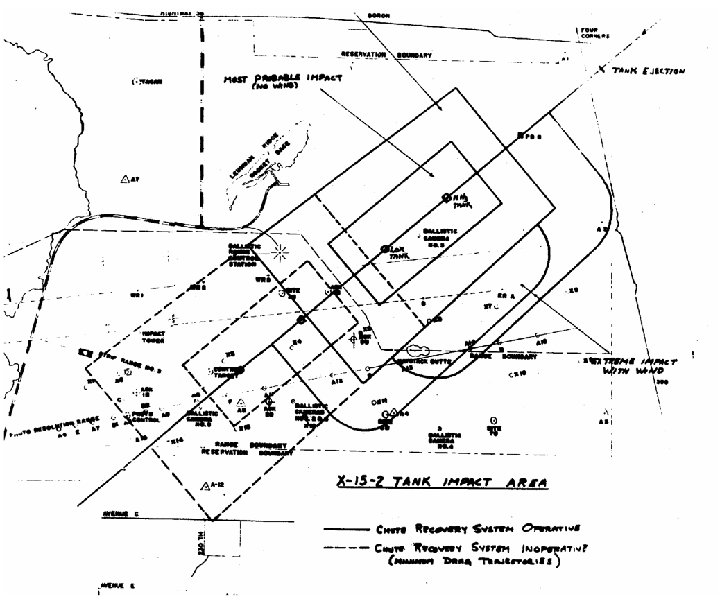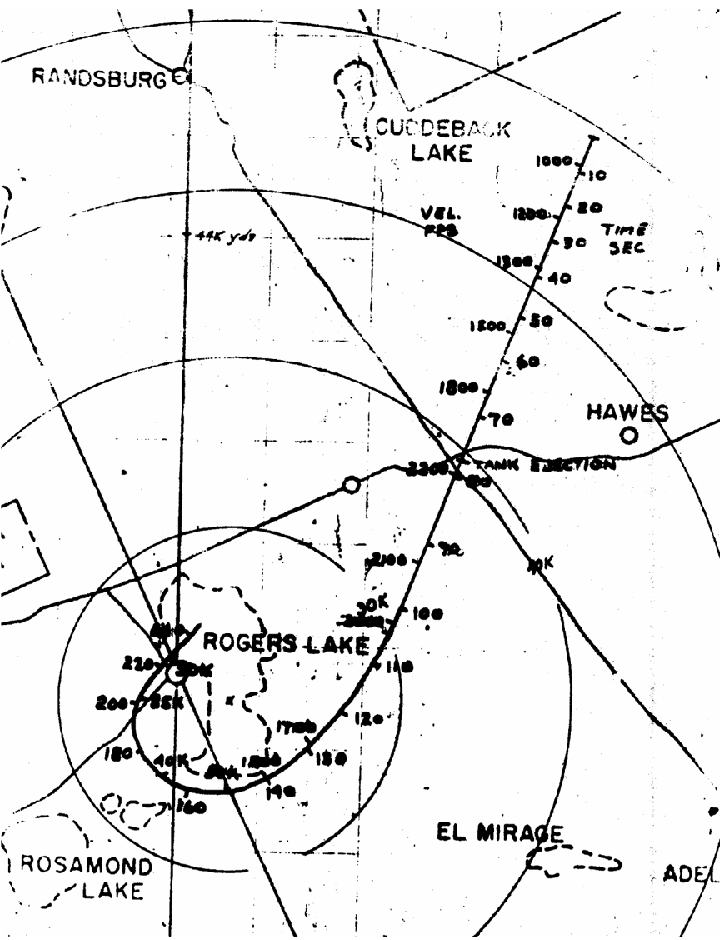
Flight No.: 2-43-75 Scheduled Date : October 27, 1965
Pilot: Lt/Col. R. Rushworth
Purpose : To obtain data for the following programs:
2. Tank Separation Characteristics (J. Adkins)
3. Tank Trajectory
(J. Armstrong)
Launch: Cuddeback Lake on magnetic heading 211°, SAS Hi-Hi-Hi (8-6-8). YAR on, ASAS Armed, BCS "OFF," RAS "OFF," ventral ON.
External tanks installed (empty)
Launch point coordinates:
35° 11' N; 117° 16' W.
| No. | Time | Alt | V | a | q | Event |
| 1. | 0 | 45 | 790 | 2 | 145 | Launch, light engine, reduce to minimum thrust. Rotate at 12° a until q = 32°. Maximum g = 1.6, maximum q = 320 psf. |
| 2. | 34 | 49 | 1250 | 12 | 300 | q = 32°. Maintain q = 32°. |
| 3. | 51 | 58 | 1450 | 7 | 260 | Push over to zero g. |
| 4. | 70 | 67 | 1850 | 0 | 270 | Pull up to 5° a (H-dot = +200). |
| 5. | 76 | 69 | 2100 | 5 | 300 | Eject external tanks. (q indicated = 315 psf.) Maintain a = 0 after trim change. |
| 6. | 80 | 70 | 2200 | 0 | 340 | Shutdown, roll to 60° right bank. Increase a to » 10° (dh = -25°). Perform » 2g turn while maintaining H-dot » -400 fps. |
| 7. | 148 | 50 | 1400 | 13 | 350 | Jettison internal propellants if energy management permits. |
| 8. | High Key - check flap and "squat" circuit breakers in. Check ventral armed. Engine master "OFF." | |||||
| 9. | Approach to landing - jettison ventral. |
Notes:
2. Emergency Lakes: Cuddeback and Rosamond.
3. Flight duration: Approximately 7 min.
4. Flight plan based on 59,900# thrust - engine #104
Total burn time at 100% = 84 sec. Minimum thrust = 37,250#.
Launch weight = 36,400#, burnout weight = 16,450#
External tank weight = 1,800#.
260# allowed for jettison check (2 sec).
2. Malfunction of any SAS channel.
3. Malfunction of inertial platform attitudes.
4. Malfunction of ball nose.
5. Malfunction of tank ejection camera.
6. Launch altitude less than 40,000 ft.
7. Average wind velocity greater than 20 kts. below 7,000 ft in direction from predicted impact point toward Rocket Base.
Failure Action
| 1. | Radio or Radar | Proceed as planned. | |
| 2. | Total damper failure or failure to ASAS | Proceed as planned. | |
| 3. | Attitude failure | Proceed - at 34 sec use 7° a instead of 32° q. | |
| 4. | Ball Nose failure | Perform rotation by trimming stabilizer to achieve 1g (dh = -5°), then let g build up gradually to 1.6g at 17 sec. Use 0.7g for tank drop. | |
| 5. | Emergency tank ejection at launch | Turn to heading » 240° pushover at 50K, extend speed brakes at 1500 fps. Shut down at 2,000 fps and vector to High Key. | |
| 6. | Delayed engine light | Eject tanks and proceed with item 5. |
7. Inadvertent engine shutdown
0 - 30 sec Cuddeback (1200 fps)
30 - Up sec Edwards

